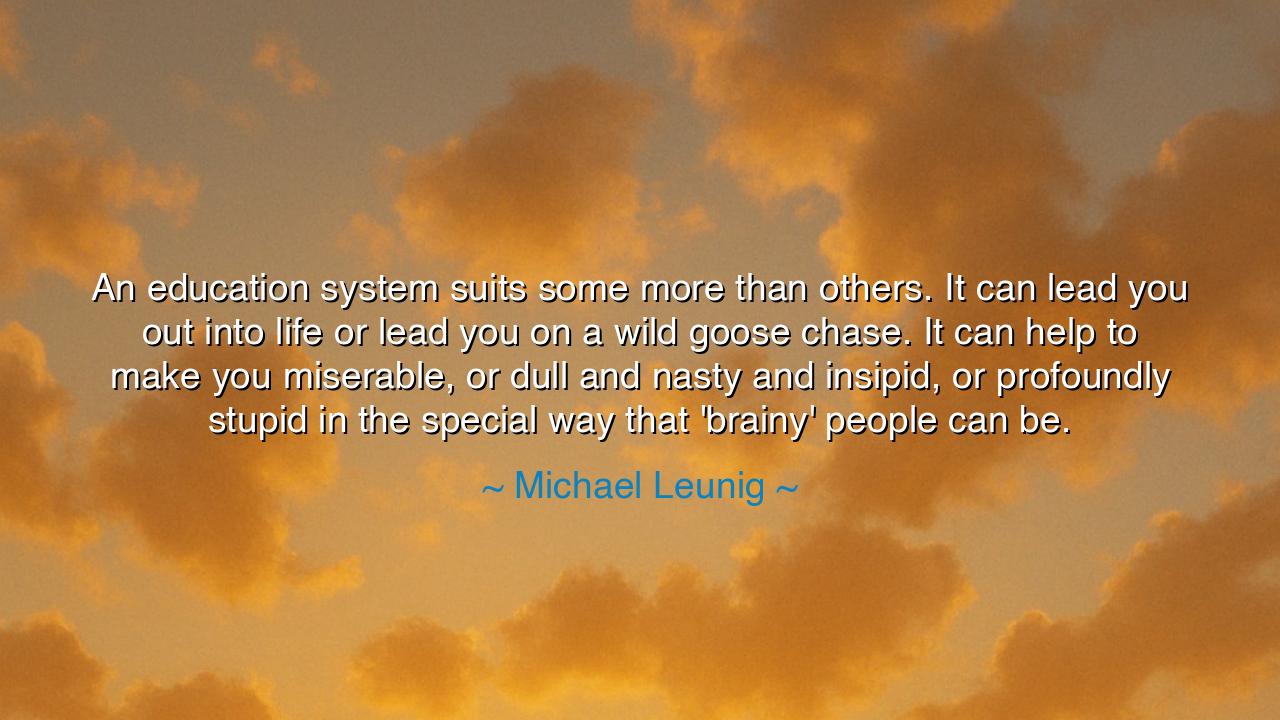
An education system suits some more than others. It can lead you
An education system suits some more than others. It can lead you out into life or lead you on a wild goose chase. It can help to make you miserable, or dull and nasty and insipid, or profoundly stupid in the special way that 'brainy' people can be.






Hear, O seekers of truth, the strange yet piercing words of Michael Leunig, the poet and satirist of the soul, who declared: “An education system suits some more than others. It can lead you out into life or lead you on a wild goose chase. It can help to make you miserable, or dull and nasty and insipid, or profoundly stupid in the special way that ‘brainy’ people can be.” In this saying, humor mingles with sorrow, irony with insight. For Leunig reveals what many have felt but few have dared to speak: that education, though sacred in its promise, may also distort, mislead, and cripple, if it forgets its true purpose.
The education system is meant to be a lamp for the journey of life. For some, it does indeed light the way, opening paths of wisdom, opportunity, and self-discovery. It teaches them not only facts, but how to live, how to think, how to flourish. Yet for others, it becomes a labyrinth, a wild goose chase where the pursuit of grades, titles, and hollow achievements replaces the pursuit of meaning. They emerge not enlivened, but weary; not inspired, but dulled. Leunig warns us that education is a double-edged sword: it may lift or it may break.
Consider the story of Søren Kierkegaard, the philosopher who grew disillusioned with the rigid scholasticism of his time. Though brilliant, he felt trapped in endless abstractions that had lost connection to real life. He saw scholars who were lauded as “brainy,” yet who, in their cleverness, became blind to truth. They became, in his words, “profoundly stupid”—not because they lacked intelligence, but because they had surrendered wisdom to vanity. So Kierkegaard abandoned the hollow halls of academic pursuit and turned instead to writing words that pierced hearts, reclaiming education as something living, not lifeless.
History too teaches us this lesson in the life of Albert Einstein. As a boy, he often clashed with the strict methods of schoolmasters, who demanded rote memorization and obedience but offered little room for imagination. Einstein later reflected that his schooling nearly crushed his spirit. Yet, freed from that rigidity, his mind flourished, and he revolutionized our understanding of the universe. Thus, Leunig’s words find echo: a system that suits some may oppress others, and one man’s fertile field may be another’s prison.
The meaning of this quote is not to despise education, but to remind us that its power must be guided with care. True education does not merely create workers or produce clever arguments; it shapes human beings. If it forgets this, it may create men and women who are efficient but hollow, intelligent but unwise, successful yet joyless. It may breed the “dull and nasty and insipid,” who know many things but lack compassion, wonder, or the courage to live authentically.
The lesson, O listener, is this: treat education not as a machine that stamps identical marks upon every soul, but as a garden where diverse flowers must bloom in different ways. If you are a student, do not measure yourself only by the system’s standards; seek the knowledge that enlivens you, that deepens your humanity, that connects you to others. If you are a teacher, remember that your task is not only to train, but to awaken, to guide, and to guard against the dangers of lifeless cleverness.
Practical action lies before you: learn beyond the classroom, nurture curiosity, and resist the temptation to chase only credentials. Ask always whether what you are learning makes you more alive, more compassionate, more whole. Support others whose paths may not fit the standard mold, and honor the many forms of intelligence. Above all, remember that education is a means to life, not an end in itself.
Thus, let us hold fast to Leunig’s wisdom: an education system may lead to greatness or to futility, depending on how it is used. Seek knowledge that gives life, not knowledge that suffocates; seek wisdom that enlightens, not cleverness that blinds. For only then will education fulfill its true calling: to set the mind free, and to lead the soul into the fullness of life.






AAdministratorAdministrator
Welcome, honored guests. Please leave a comment, we will respond soon